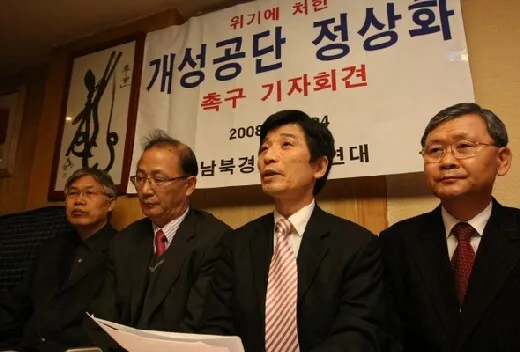hankyoreh
Links to other country sites 다른 나라 사이트 링크
[Analysis] Gaeseong Industrial Complex faces uncertain future

The Gaeseong Industrial Complex project is in crisis because of various simultaneous actions towards the South taken by North Korea on November 24. The actual operation of the plant has not been halted, but it is expected that corporate activity at the industrial complex is going to suffer because of a reduced number of Southern personnel resident there, restrictions on travel over the Military Demarcation Line, and a smaller role for the management commission there.
South Korean companies at Gaeseong are of two reactions. Some expected the North to close down the place altogether, and are relieved that it was not as bad as expected, at least as far as their business activities are concerned. In a notice sent to the Gaeseong Industrial Park Management Commission, Northern officials announced that resident employees from South Korean “construction, services, and other companies will be reduced to half.” It also said, however, that “out of consideration for the difficult position of mid-sized companies, their business activities in the Gaeseong Industrial Complex are going to be especially guaranteed,” and that “employees of Southern companies stationed as residents who are absolutely needed for management can remain, and will be excluded from the action being taken to suspend land (travel) across the Military Demarcation Line.”
Jang Ho-seon of the timepiece company Romanson said he “is at least taking relief in the phrase ‘especially guaranteed.’”
“They also said personnel really needed for management could stay, but that is different from saying they are going to just make a big cut of half,” he said. “The Northerners probably realize that the personnel who are living there are essential to production activities at the factories” in Gaeseong. He added that he thinks “flexibility will be able to be exercised” with regard to travel by land between Gaeseong and South Korea for Southerners living in the city for business purposes. Currently, Romanson has approximately fifty employees stationed in the Gaeseong Industrial Complex.
Other companies, however, are very worried that companies are going to suffer because of various harsher controls and restrictions. The day of the announcement, the North also demanded to know the “present status” of resident employees and company vehicles. Companies are inevitably going to suffer enormous problems if the North starts to get fastidious about the Southerners living there. Restrictions on land travel, some companies say, will also significantly hurt companies if the North gets serious about them.
“Corporate activity encompasses more than simply production in Gaeseong,” said Choi Dong-nam of DMF. “We need to be able to have people freely visit Gaeseong for things like orders and investment, so if land travel gets cut off it will be like strangulation.”
Many are concerned that this latest move by the North might not be its last. Indeed, the North has already declared that the day’s announcement is something of a first step, and the possibility it could completely shut down Gaeseong depending on what happens with inter-Korean relations cannot be excluded. Kim Kyu-cheol, the director of Citizen Solidarity for Inter-Korean Economic Cooperation, expressed concern that the North could go through a gradual process of additional travel restrictions, deportation of Southern residents, deliberate pressure on Southern companies to leave, and a withdrawal of facilities and equipment from the city.
Some 1,236 Southerners and 33,688 Northerners work at a total of 88 South Korean companies in the Gaeseong Industrial Complex. Gross product between when production first began in December 2004 to September 2008 was US$459.9 million.
Please direct questions or comments to [englishhani@hani.co.kr]
Editorial・opinion
![[Column] The end of the road for NewJeans, or a new beginning? [Column] The end of the road for NewJeans, or a new beginning?](https://flexible.img.hani.co.kr/flexible/normal/500/300/imgdb/original/2025/1022/3617611258545507.jpg) [Column] The end of the road for NewJeans, or a new beginning?
[Column] The end of the road for NewJeans, or a new beginning?![[Editorial] Korea must prepare for rough road ahead with Japan [Editorial] Korea must prepare for rough road ahead with Japan](https://flexible.img.hani.co.kr/flexible/normal/500/300/imgdb/original/2025/1022/5517611229374291.jpg) [Editorial] Korea must prepare for rough road ahead with Japan
[Editorial] Korea must prepare for rough road ahead with Japan- [Editorial] Korea cannot afford to rush to a deal with the US
- [Column] Shared dilemmas at a historic turning point for Korea, Europe
- [Column] Halfway across the world, I’m cheering on Americans fighting for democracy
- [Column] How meritocracy turns into tyranny
- [Column] The real scandal of Korea’s ‘divorce of the century’
- [Column] The meritocracy to fascism pipeline
- [Column] Korea is not an enemy to be plundered
- [Column] Chaebol can’t take credit for KOSPI’s record rally
Most viewed articles
- 1Behind far right’s success is the failure of establishment parties, says expert
- 2North Korea fires ballistic missile toward East Sea
- 3Trump’s interest in Kim Jong-un stems from real estate development hopes, says ex-US official
- 4[Editorial] Korea must prepare for rough road ahead with Japan
- 5[Column] The end of the road for NewJeans, or a new beginning?
- 6[Interview] Politics of care as an antidote to divisions caused by meritocracy
- 7New hard-right Japanese PM poses test for Lee’s vision of Seoul-Tokyo cooperation
- 8World's top tennis player faces No. 2 in exhibition event in Seoul
- 9Senior Korean officials head back to US for final coordination before summit next week
- 10Korea’s Democrats unveil plan to expand Supreme Court from 14 to 26 justices